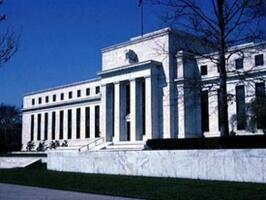It's a Fiscal Problem, Not a Fed Problem
A Commentary By Lawrence Kudlow
Ben Bernanke threw a curveball in his midterm report to Congress this week. The Fed view of the economy has been downgraded since it last reported in February. Although the official Fed forecast for 2010-11 is still 3 percent to 4 percent real growth, Bernanke sounded particularly gloomy when he characterized the economy as "unusually uncertain." And he indicated that the majority view of the Fed Board of Governors and Reserve Bank presidents is that the risks to growth are "weighted to the downside."
But here's the disconnect. With no inflation and weaker growth, including stubbornly high unemployment, Bernanke mostly talked about an exit strategy that would shrink the Fed's balance sheet by removing liquidity. This was the Fed's bias last winter when the recovery looked stronger. Now that the recovery looks weaker, the stock market was hoping to hear Bernanke hint of an easier policy that would increase liquidity if necessary. Didn't happen.
At the end of two days of testimony, Bernanke's message seemed to be this: Expect the zero-interest-rate policy to be extended for another year. Futures markets now predict free money until September 2011.
Whether the economic outlook is as downbeat as Bernanke suggests is an interesting question. The vast majority of corporate profit reports for the second quarter show better-than-expected earnings and top-line revenues. In other words, the CEOs are a lot less pessimistic about the future economy than Wall Street or Main Street. And a combination of strong profits, a zero interest rate and a positively sloped Treasury yield curve would certainly seem to rule out a double-dip recession.
One year into recovery, however, private jobs should be growing much faster and unemployment should be a lot lower. Following a deep recession, economic growth should be closer to 8 percent than 3 percent.
But there are limits to Fed fine-tuning. The central bank can produce more money, but that doesn't mean it can produce more jobs.
Look, the Fed has already injected $1.4 trillion of new money into the economy, of which about $1 trillion of excess reserves are unused and on deposit at the central bank. Putting it another way, the economy has more liquidity than it knows what to do with. What's the problem? All that excess money is not being used. And this, I believe, is a fiscal problem, not a Fed problem.
Think of all the economic obstacles of spending, taxing and regulating coming out of Washington. What should be done to spur growth? Keep tax rates down. And stop passing massive regulatory bills, like the bank reform Obama just signed into law.
What else? The White House and Congress should end the war between business and Washington. Listen to what the CEOs are saying. Reduce the uncertainty premium caused by massive deficit spending and 2,500-page regulatory bills. Stop the assault against entrepreneurship. Keep down the cost of new job hires. Stay focused on free-trade expansion.
And then reduce tax rates for large and small businesses across the board. Speed up business investment tax write-offs. And extend the George W. Bush tax cuts for another couple of years until a true pro-growth tax reform can be developed -- one that will flatten rates, simplify the code and get rid of unnecessary tax expenditures (which really are spending increases, not tax cuts).
In other words, since businesses create jobs, provide businesses with a new round of tax incentives. Reduce their capital costs and raise their investment returns after-tax.
Noteworthy is a move by several Democratic senators -- like Evan Bayh, Ben Nelson and Kent Conrad -- who are calling for an extension of all the Bush tax cuts, including lower tax rates for upper-end earners, capital gains and dividends. These brave souls are now in open revolt against the White House.
With gold near $1,200 an ounce, the Fed has done its job and then some in providing liquidity. Easier tax rates, rather
than easier money, is what will spur jobs and a faster recovery.
COPYRIGHT 2010 CREATORS.COM
Views expressed in this column are those of the author, not those of Rasmussen Reports.
See More Commentary by Lawrence Kudlow
See Other Political Commentary
Rasmussen Reports is a media company specializing in the collection, publication and distribution of public opinion information.
We conduct public opinion polls on a variety of topics to inform our audience on events in the news and other topics of interest. To ensure editorial control and independence, we pay for the polls ourselves and generate revenue through the sale of subscriptions, sponsorships, and advertising. Nightly polling on politics, business and lifestyle topics provides the content to update the Rasmussen Reports web site many times each day. If it's in the news, it's in our polls. Additionally, the data drives a daily update newsletter and various media outlets across the country.
Some information, including the Rasmussen Reports daily Presidential Tracking Poll and commentaries are available for free to the general public. Subscriptions are available for $4.95 a month or 34.95 a year that provide subscribers with exclusive access to more than 20 stories per week on upcoming elections, consumer confidence, and issues that affect us all. For those who are really into the numbers, Platinum Members can review demographic crosstabs and a full history of our data.
To learn more about our methodology, click here.


